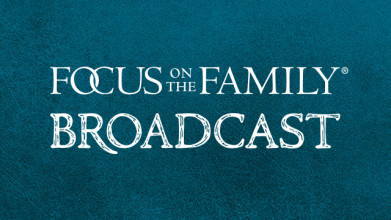
The War of Words
In this Adventures in Odyssey drama, a carelessly uttered word from Eugene creates havoc as it becomes the fashionable insult, resulting in a lesson about the power of words.
Home » Episodes » Focus on the Family Broadcast » Sharing Christ in a Cancel Culture (Part 2 of 2)
Joe Dallas: I’m so worried about not being holier than thou that at times I’ve been afraid to speak at all.
John Fuller: Mm-hmm.
Joe: Okay? Well, there’s nothing holy about being silent when you are supposed to speak, and I had been given a great opportunity there.
John: Joe Dallas was on Focus on the Family last time, encouraging us to be ready to share our faith with others respectfully and honestly when the Spirit leads, and the opportunity comes. Joe is back with us to navigate the challenges of cancel culture, and your host is Focus President and author, Jim Daly. I’m John Fuller.
Jim Daly: John, I so appreciate Joe Dallas and his tender heart for others who don’t share our Christian worldview. Uh, he sees them as people who are deeply hurting and who need a Savior, just like you and me.
Uh, last time Joe shared about embracing a homosexual identity as a young man and trying to justify it theologically. That’s happening a lot today. Until God changed his heart and helped him to see that homosexuality is incompatible with scripture. Those experiences have given him a unique perspective, and he has great advice today to help us reach others for Christ.
John: And he does so in such a winsome way. Joe Dallas is an author, conference speaker, and pastoral counselor. Uh, he founded Cloud Fire Ministries in Tustin, California. Uh, they help men dealing with sexual addiction and other sexual and relational problems.
And Joe has, uh, written a, a great book that’ll form the foundation of the conversation. It’s called Christians in a Cancel Culture. Contact us for your copy, uh, when you’re at focusonthefamily.com/broadcast, or call 800, the letter A, and the word FAMILY.
We’re going to pick up the conversation where we left off last time as Joe was talking about our responsibility as Christians to keep the main thing the main thing, loving others through Christ.
Joe: And I think that the church’s position has got to be one of simplicity.
Jim: Yeah.
Joe: Simplicity meaning this, Jim. I think we try to get too fancy and figure out, okay, let’s start really doing extensive research to see how we can better communicate and finesse all of the things we need to do. Now, good grief, if the early church had thought that way, the gospel would have never gotten past Samaria.
Jim: Right.
Joe: I mean, I think that we need to get back to the basics of realizing the Word of God is still living and powerful if we will preach it faithfully. We preach evangelism to the unsaved. They need to be born again. If somebody’s transgender or homosexual or whatever they are, if they have not been born again, that’s secondary. You know?
Jim: Right, right.
Joe: Let’s always be humble enough to examine ourselves, examine the way we are presenting truth, examine the way we relate to people. Let’s be aware of who we are.
Jim: Yeah.
Joe: We’ve been forgiven much.
Jim: And I, uh, uh-
Joe: So let’s love much.
Jim: I want to come back to that idea, but in the context of marriage, what you were talking about-
Joe: Mm-hmm.
Jim: … a moment ago, I, I remember having dinner at a, uh, you know, a, a banquet, and sitting at my table was a Catholic priest. And he looked at me and said, “You know what we believe about marriage in our church?” No, tell me. And he said, “You know, Lucifer was upset that God chose to put his image in humanity, male and female, that they were created in his image, and that was… Lucifer felt the angels should have that anointing. That God’s imagine should be placed in the angels.” And he said, “Every day when Lucifer attacks, when Satan attacks marriage, it’s because marriage, uh, represents the very image of God-
Joe: Darn, that’s interesting.
Jim: … on this Earth.”
Joe: I’ve never heard that before.
Jim: Yeah, isn’t it? It’s a beautiful way to look at it.
Joe: That’s interesting, yeah.
Jim: And he said it’s a stench in the nostrils of Satan-
Joe: Mm-hmm.
Jim: … to see a, a man and woman married and exhibiting the very nature of God.
Joe: Hmm.
Jim: Because the Lord Himself said, “The two shall become one flesh.”
Joe: Right, right.
Jim: “And this represents My divine nature.”
Joe: Wow! Oh.
Jim: That makes you think differently-
Joe: Absolutely.
Jim: … about your, your wife or your spouse, right?
Joe: Yep. Yeah.
Jim: So that’s one thing. L-let me also go to a scripture that’s meant a lot to me, and there’s other scriptures you can, as you said earlier, you can squeeze scripture to say many things.
Joe: Yep.
Jim: Um, and many things that it doesn’t intend to say, right? So you isolate a scripture. But there’s other scriptures that support what I’m about to read. This one’s out of 2 Timothy, and it really spoke to me in terms of errors, perhaps, that we’ve made in the church-
Joe: Mm-hmm.
Jim: … about how we treat the world. But it says this. Let me read it. “So flee youthful passions and pursue righteousness, faith, love, and peace, along with those who call on the Lord from a pure heart. Have nothing to do with foolish, ignorant controversies. You know that they breed quarrels.”
Joe: Mm-hmm.
Jim: “And the Lord’s servant must not be quarrelsome, but kind to everyone.” Not most people.
Joe: Yeah.
Jim: “Kind to everyone.” “Able to teach patiently, enduring evil.” I don’t think we do that well. “Correcting his opponents with gentleness. God may, perhaps, grant them repentance, leading to a knowledge of the truth, and they may come to their senses and escape from the snare of the devil after being captured by him to do his will.” That really captures everything we’ve been talking about.
Joe: That’s a good job description, isn’t it?
Jim: And, uh, I think, from that standpoint, how often, now applying that to the modern church, that we seem to have one foot in the cultural war battling out of our flesh-
Joe: Right.
Jim: … and then this other foot in God’s truth-
Joe: Mm-hmm.
Jim: … knowing that love is probably the most significant weapon that God gives us. But the other half of us doesn’t want to use that (laughs), because it’s freakishly-
Joe: Yeah.
Jim: … inadequate.
Joe: Yeah.
Jim: Or at least we think so.
Joe: I, I think so. I think… Look, I think balance is a much greater challenge than getting stuck in one extreme or the other.
Jim: Mm-hmm.
Joe: There’s grace. There’s truth. And we tend to want to make it one or the other, rather than-
Jim: Rather than both.
Joe: … accepting the biblical challenge, the recognition that in true Christlikeness there’s both. And I think it’s also one of the sicknesses of the time, Jim, we’re hooked on contention. I’m, uh, it’s like when we were in school, how could you draw a crowd? Yell, “Fight. Fight, fight, fight.”
Jim: (laughs)
Joe: Everybody’s gonna come around. That’s what we got going.
Jim: That’s called social media.
Joe: Oh, absolutely.
Jim: It’s not good.
Joe: Uh, I even look at half the reality shows that you see ads for, and they’re about people fighting.
Jim: Yeah.
Joe: I guess that’s how you have a hit show these days.
Jim: Yeah. No, it’s true.
Joe: Mm-hmm.
Jim: Uh, you’ve identified three unhelpful responses to cancel culture that we can learn from. Uh, what are they?
Joe: Well, there’s raving, of course. I mean, when we rave, uh, uh, I’ll talk about two extremes. One is, is the wrath of man. The other is the fear of man. Right? “The wrath of man,” James said, “does not work the righteousness of God.” When you rave, you’re basically saying, “I am so tired of you calling me a hater. I’m tired of all the nonsense you’re giving me. I’m tired,” you know?
Jim: Yeah.
Joe: “I’ll show you bigotry if you want to see bigotry.” And then we start trying to fight the battle in our own strength. Now, there’s a place for righteous anger, I get that. And Paul told the Ephesians, “Be angry, sin not.” Okay? Some of the stuff you and I have been talking about, the abolitionist movement.
Jim: Right.
Joe: The resistance to the Holocaust.
Jim: Just change it.
Joe: That was born of righteous anger.
Jim: Yeah.
Joe: So, okay, fine. We want to use that properly. But I think that, that what happens is we get so mad at the people who are opposing us we want to hurt them or restrict them or be right and win the battle. Now that’s the wrath of man. So that’s raving. And I’ve been guilty of that.
But then there’s caving. That’s another extreme. That’s the fear of man, which brings a snare, according to the Proverbs. And I think that, um, when we are afraid of not being seen as likable, when, when we want to be liked so badly, I think that, that we are in real danger of compromising. And an interesting point, you talked about having relationships with people who disagree with us, Jim. You’re not gonna have a healthy relationship with the people, we’re not gonna have one if we’re caving, because they don’t respect that. I really find a lot of gay people, a lot of atheists, a lot of feminists, a lot of liberals, a lot of radicals, respect a Christian who will just say, “This is where I stand,” than a Christian who is so wanting to make a sale and meander and be liked that-
Jim: Caving.
Joe: They, they can sense that insincerity, and they’re like, “Yeah, I don’t trust you.” They’ll trust somebody more who just says plainly, “Yeah, this is where I stand, but I’d like to understand where you stand better, see where we have some common ground.”
Jim: Hmm.
Joe: “See if we can exchange ideas and do so in the context of a respectful relationship.” Now, you know, and I know some people will never go into that, but, but plenty of people still will. And there is still a place for reasoning with people. So that’s why I say we don’t want to cave. But we also do need to get over the idea that every time somebody criticizes us, every time somebody points out a mistake we made, even every time somebody mocks us, we’re not being persecuted.
Jim: Hmm.
Joe: You know? I mean, I… Everybody, you know this better than I do with all the, the position you hold, the influence you have, anybody who speaks publicly. We accept the fact that people have a right to scrutinize what we say.
Jim: Sure.
Joe: When someone is limiting you, they’re limiting your freedom, they’re limiting your speech, they’re limiting your movement, they’re limiting your capacity, that’s persecution. They are imprisoning your ability to express.
Jim: Yeah.
Joe: Because look, if you can’t express, what are you here for? Christianity without expression is no Christianity. Expression… We cannot allow ourselves to be denied expression. We can’t. Or if somebody is actually damaging you, they’re literally harming you because of your position, because of the positions you hold. But just because persecution is not the same degree as other forms of persecution, does not mean it’s not persecution.
Jim: So, today, uh, there’s probably two things that come to my mind. One is social media, whether it’s Twitter, Facebook-
Joe: Mm-hmm.
Jim: … what have you. Twitter is probably the, the greatest controller of speech-
Joe: Oh, yeah.
Jim: … and it’s popping up everywhere. Elon Musk has gotten involved. And, uh-
Joe: Fascinating.
Jim: … you know?
Joe: It’s real-
Jim: Yeah, it’s really fascinating, actually-
Joe: I mean really it is.
Jim: … because I think he’s right, frankly.
Joe: I do, too.
Jim: But I, I know even Focus On the Family, we had made a comment about Dr. Levine, who is transgendered, and we just said that means, because many people in our audience don’t know what that means.
Joe: Mm-hmm.
Jim: So we said, you know, that’s a, in his case, it’s a man, born man-
Joe: Mm-hmm.
Jim: And then, uh, you know, he changes his identity-
Joe: Mm-hmm.
Jim: … and believes himself to be a woman.
Joe: Yeah.
Jim: That caught Twitter.
Joe: Yeah.
Jim: They said that was hate speech. I, I met with the executives via Teams. We had a meeting and talked about it. It made no sense to me. I said, “We’re actually expressing the greatest thing we can as Christians, because we believe in Jesus Christ.” Believe is quite a strong statement-
Joe: Mm-hmm.
Jim: … for the Christian community.
Joe: Mm-hmm.
Jim: So when we say of Dr. Levine that he was born a man but believes himself to be a woman, that’s actually a strong-
Joe: Sure it is.
Jim: … statement.
Joe: Yeah.
Jim: Uh, but, uh, they said, “No. You’ve got to change it to ‘identifies’.” They didn’t even recommend it. We just said, “Well, let’s try to change it to identifies.” And that was acceptable then.
Joe: Mm-hmm.
Jim: But that’s a, that’s an example of that kind of persecution that you’ve got to speak a certain way in order to be acceptable to our platform.
Joe: It’s Orwellian.
Jim: A-and that’s, and that is very subtle.
Joe: Yeah.
Jim: I mean, think of the difference there. Um, the other that I want you to respond to is when you’re losing your job. I mean, this is happening a lot in high school, school campuses-
Joe: I know.
Jim: … including universities, where people, you know, Christian people, have a different way of framing the world, and they’re being actually fired for that. I thought that was illegal, because protection of religious expression I thought was protected by the Constitution. And, thankfully, some groups like ADF and Liberty-
Joe: Right.
Jim: … uh, they’re stepping up. Becket Fund, they’re stepping up-
Joe: Mm-hmm.
Jim: … to defend these cases, and winning most of them-
Joe: Yes.
Jim: … ironically, I mean, they’re winning 90-95% of them.
Joe: Yeah.
Jim: So that shows that it’s on our side.
Joe: Mm-hmm.
Jim: But speak to that idea of loss of job or persecution within the workplace.
Joe: I’m not gonna be flippant about this, Jim.
Jim: Mm-hmm.
Joe: Because, you know, my job-
Jim: Yeah.
Joe: … I have a Christian ministry. I mean, I operate in Christian society. I’m not gonna lose my job because I’m not gonna fire myself.
Jim: Right.
Joe: So it’s very easy for me to sit here and say, “Well, you should take a stand whether you lose your job or not.” You’ve got people whose children are depending on them. You’ve got people who will lose their homes if they can’t pay their mortgages. Uh, so I’m not gonna be glib when I say there are some hills to die on, because there are.
Jim: Mm-hmm.
Joe: Now, Jesus said, “If they persecute you in one city, flee to another,” meaning, look, if there is a way to avoid persecution, do it. If you can avoid it without sacrificing your integrity.
Jim: Mm-hmm.
Joe: I’m all for that. However, if you really are in a position in which you must either give lip service to what you don’t believe in, you must say, “I believe a biological male can become a female.” “I believe that marriage can be defined as a male-to-male union and female-to-female.” If you are put in the position where you are told you must give lip service to that, then, and then only, I think you’re gonna have to take a cue from Peter and John and say, “Look, I’m sorry. We ought to obey God rather than man.” Now, I am going to appeal this, I am going to try to keep my job. I don’t want to be an enemy, but you are unreasonably trying to put words in my mouth and impose beliefs on me that I would not… I would not impose my beliefs on you. You’re doing this to me. I can’t do it.
So, I do think there will be a very high price a lot of people will have to pay. But I think in the end it would be better to pay it. And, again, believe me, I’m not casual when I say this, because I know the ramifications of this are gonna be huge for a lot of people.
My prayer is that there’s gonna be enough pushback that it’s not gonna come to that. I think all it’s gonna take is a few Supreme Court cases and a few public examples of people saying, “No, we’re not gonna tolerate this kind of heavy handedness,” and at least that part of the madness could be, if not reversed, at least it could be stalled. I’m hoping for that. But bottom line, I think that when it really comes down to the matter of conscience versus the ability to hold your job, you’ve got to go with conscience.
Jim: Yeah. I, uh-
Joe: I, I really do. I don’t see what else a person can do.
Jim: And you can do that in a dignified way.
Joe: As much as possible.
Jim: You don’t have to be militant about it. As a theologian once told me, “You don’t have to go out of your way to be hated.” (laughs)
Joe: Good point.
Jim: Which is a great statement.
Joe: Good, good point. There’s plenty of that waiting for you if you do it.
Jim: Let the scripture be the offense.
Joe: Right.
Jim: But not your personality.
Joe: Right.
Jim: And I’ve, I’ve taken that to heart. Um, I do want to touch on something you were mentioning a little while ago, and that is, um, the failures of the church.
Joe: Yeah.
Jim: People in the church. Boy, there’s been a lot of it lately, mostly around sexual sin.
Joe: Yep.
Jim: But one of the things is I talk to journalists who call me to get input about these things. And they’ll make the statement, “Well, you know, the church leadership seems a bit hypocritical.” I’ll cut them off and say, “Of course, we’re all hypocrites. We can’t live this life perfectly,” and we’re gonna fail and stumble, but it doesn’t nullify the truth of God’s Word. It just means we’re pathetic living it.
Joe: Right.
Jim: Right?
Joe: I mean, yeah.
Jim: And, and, and so in that context, I mean, I think we do need to apologize for those that do not live it well.
Joe: Mm-hmm.
Jim: That, um, fail. And we’re sorry that that happens, but it does reinforce the very fact that we need Jesus as a Savior (chuckles).
Joe: Sure.
Jim: All of us.
Joe: Uh, I think, Jim, the fact that people do not live up to the standard they promote does not invalidate the standard. So, in all fairness, and this, this is done by people on the political, social, theological left, center, and right. There are people who promote standards that they themselves do not live up to.
So, I think in most cases, but what people, if they’re fair, will recognize is there are a lot of Christian leaders who have promoted standards that they themselves did not live up to. Now, what we have to be careful to do is two things simultaneously. We do have to live what we preach. Good night, we’ve got no business shooting our mouths off about principles we don’t live up to. We also have to be honest about our imperfection. So here on the one hand I’m saying, I strive to live up to the principles I promote. And, yes, when it comes to the sexual arena, for obvious reasons. I’m a married man, I’m a leader of a ministry centered on sexual purity. Yes, I am living what I teach and what I promote. But I am not living it perfectly to the extent that I never have a wayward thought or a wayward desire.
Jim: Right.
Joe: And I can tell you a thousand and one other areas of my life that are very wayward. My own big mouth, my ego, my laziness, my unforgiveness, my, my, you know? The list goes on. So we, we need to be sure we’re not pretending to be more than what we are, you know?
Jim: Yeah, I agree. And I think it’s a far better way to go, because-
Joe: You bet.
Jim: … people connect to brokenness. They don’t per-, connect to perfection.
Joe: Exactly right.
Jim: Because they know themselves-
Joe: Exactly right.
Jim: … better than we know ourselves, right?
Joe: Yeah.
Jim: And we’ve gotta be able to say in this world we’re broken. Uh, Joe, let me, let me go to a birthday party, because I think this really captures the spirit of what we’re talking about.
Joe: Mm-hmm.
Jim: You were invited to go to a friend of yours from the time when you were-
Joe: Oh, my goodness.
Jim: Yeah.
Joe: Yeah.
Jim: You were, uh, you know, in the gay community.
Joe: Yeah, yeah.
Jim: And y-you became Christian, became a Christian apologist for-
Joe: Mm-hmm.
Jim: … sexuality-
Joe: Mm-hmm.
Jim: … etc. But they invited you and you decided to go.
Joe: Mm-hmm.
Jim: Tell me about that experience being the only person of your worldview in a room-
Joe: Yes, I was (laughs).
Jim: … full of gay people that knew you in one context and-
Joe: Mm-hmm.
Jim: … were like, “What’s going…” How did that go down?
Joe: Well, that was awkward. But, uh, also it was very instructive.
Jim: I give you points for going, you know?
Joe: Yeah. Well, you know what? These were friends of mine, though. I mean-
Jim: Yeah.
Joe: Jim, when I left the gay community in ’84 I lost most of my gay friends, not because I said, “I won’t hang out with you anymore.”
Jim: Right.
Joe: But just because, what do you say?
Jim: What do you talk about? (laughs)
Joe: And when I say, “Hey, I’ve reached a point where I realize homosexuality is a sin. I need to transplant and start a new life,” well, by implication I’m obviously saying, “I think you’re in sin, too.”
Jim: Right.
Joe: That doesn’t make you popular. But I had some gay friends who really respected me, and I respected them, and we still had a relationship.
Jim: Yeah.
Joe: I went with my… She was at the time my fiancée, my wife Renee. We had known this couple, and, uh, a couple of great guys. I mean, they obviously disagreed with me on this, but we were able to maintain a relationship. They had met Renee. We had gone out to dinner with them. We, we just had really enjoyed-
Jim: Yeah.
Joe: … as friends. It was great. They invited me to a birthday party, uh, one of them w-was having a birthday. We show up there, we’re the only straight people there. And, um, after a while, as the drinks were flowing and people were getting a little more rambunctious, it, um, one, uh, gay attorney cornered me and said, “What are you doing here? And who is she? And what are you about? And how do you know these two? And what,” you know? And I-
Jim: The interrogation began.
Joe: What… Right. And, you know, I was scrambling for some diplomatic way to say, “Oh, you know, I know their cousin and so we got invited (laughs).” But I had to just say, “Well, I, I knew them because I was part of the community.” Well, as soon as I said that, I mean, as I said in the book, it seemed like even the disco music started getting quieter. I mean-
Jim: Right.
Joe: … everybody was just, “Oh?” Yeah (laughs). It was like when that investor talks, everybody listens, you know (laughs)?
Jim: Right (laughs).
Joe: Okay. But… And the crowd starts-
Jim: … gathering.
Joe: Oops. And he started saying, “Now, wait a minute. Are you one of those? Are you part of the moral majority? Are you here to cond-,” you know? And all of this.
Jim: Hmm.
Joe: And so he said, “I want to know your beliefs. I want to talk about why you do what you do.” And it was actually a wonderful setup. So Renee and I, we thought it was one of those carpe diems. Okay, here we go. And I started just politely explaining. “I’m like a lot of people. I reached a point where I realized that if I went with what I felt, it would take me outside of what I believed.” We can all relate to that.
Jim: Yeah.
Joe: Nonbelievers can relate to that.
Jim: Mm-hmm.
Joe: So that was our common ground. That was like Paul talking to the Athenians. “Well, I see you’re religious. So am I. Let’s start with that.” And then I explained how I had been basically interrupted by God. And Renee gave her testimony, um, and, which was much more moderate than mine, but we both… And then we talked about how we had met.
Jim: All at this party.
Joe: All at this party.
Jim: That’s amazing.
Joe: That… This was a party, for heaven’s sake.
Jim: Yeah.
Joe: And yet the whole thing is like the group is gathered around. And you know what, Jim? By and large, I mean, they teased us a little. I mean, you know?
Jim: Sure, sure, sure, sure.
Joe: There was, “Oh, right. Well…all you…” you know? But it was friendly teasing. You could not have asked for a group of more respectful people. And what it showed me was don’t be so darn timid about things, okay? I’m so worried about not being holier than thou, that at times I’ve been afraid to speak at all.
Jim: Mm-hmm.
Joe: Okay? Well, there’s nothing holy about being silent when you are supposed to speak. And I had been given a great opportunity there. And Renee and I kind of jumped in. We were both just scared to death, like, “Wow, what are they gonna do? Drown us in the pool?” But you know what? They were all… I’ve got to give them plenty of points for this. They all said, “Well, you know, it’s beautiful that you’re following what you believe you need to do, and, hey, we don’t agree with you, but, well, that’s fine, you know? And whatever.” Now, I’m not saying every time you talk to a party full of gay people it’s gonna play out that way. But what I am saying is we’ve gotta learn that part of authenticity means being a willingness to give honest answers to honest questions.
Jim: Yeah.
Joe: Nobody is gonna be helped, nobody is gonna receive Christ, nobody’s gonna be turned to truth, nobody’s gonna be built up if we’re not plainly speaking truth. And just because we don’t want to be self-righteous or judgmental or pompous doesn’t mean that we can’t be reasonably honest and clear.
Jim: Yeah. And I think, Joe, the encouragement there is to read the Word, to know the Word, so that in those moments you’re prepared to give an answer-
Joe: Absolutely.
Jim: … in a very-
Joe: Absolutely.
Jim: … direct way. I’ve had that same experience in terms of being in, in, you know, those places, those parties, you might say (laughs).
Joe: Yeah, yeah.
Jim: Where those questions have been asked of me, and, again, don’t go out of your way to be hated.
Joe: Yeah.
Jim: Just express the Word of God. Do justice to what Jesus has done in your life, and then let it fall. I think… I can’t think of an environment that I’ve been in in that regard where it’s been, uh, purely negative.
Joe: Mm-hmm.
Jim: People will do exactly what you say. They’ll say, “Well, I disagree with you, but I respect what has happened to you.” And, you know, that great scripture that “They overcame by the blood of the Lamb-
Joe: Right.
Jim: … and the power of their testimony.”
Joe: Right.
Jim: Nobody can assail what you’ve experienced.
Joe: Yeah, exactly.
Jim: I mean, this is what you’ve experienced.
Joe: Exactly.
Jim: And, if anything, it hopefully will hook somebody into asking more questions.
Joe: Mm-hmm.
Jim: And maybe, just maybe, setting them on their own journey to find the Lord for themselves.
Joe: Yeah.
Jim: And that’s it. Now you’ve accomplished the goal.
Joe: I mean, Jim, there was a time when people had every reason to believe it would be a waste of time to talk to Joe Dallas.
Jim: Yeah.
Joe: I mean, so why, why should I be reluctant to recognize the same Holy Spirit that convicted me is alive and well and still working in people? Why should it be any different now?
Jim: Yeah. Okay. We’ve got a few minutes left, Joe, and we… I think we’ve painted the landscape pretty well-
Joe: (laughs)
Jim: … but, man, we gotta, uh, give people the power as best as we can-
Joe: Yeah.
Jim: … knowing the Word as best as we do.
Joe: Yeah.
Jim: Uh, um, getting back to those basics. Love God first, confess those sins, try to live a life that is exemplifying the very heart of God, knowing that we’re sinners and we’re gonna fail.
Joe: Mm-hmm.
Jim: But not accepting it, you know?
Joe: Yeah.
Jim: Trying to live a, a good life-
Joe: Right.
Jim: … so people can see Christ in us.
Joe: Right.
Jim: What else should we do to fight this battle in the culture?
Joe: I think one of the best ways to fight battles in the culture is to become a good listener.
Jim: Hmm.
Joe: I think if, if… because people are hungry to be heard, Jim. And I think if you as a Christian on the job, or with a family member, you’re hearing people who disagree with you. You come to the holiday seasons and, you know, different family members are around the table expressing different world views. I think rather than jump in by saying, “Well, this is what I believe,” I’m, I, I think it’s very helpful to say, “Okay, you know, I would love to understand more about what you believe, how you arrive at truth, what your worldview is, what your life has been, and then let me tell you mine. Let’s see where we can agree. Let’s see where we disagree. Let’s see where we can reason with each other.” Because then you’re basically saying I’m not just seeing you as somebody I want to make a pitch to and close the deal. I want to know you, and I want you to know me, and I want us as human beings to, to be adult enough and respectful enough to recognize we can have differences and it’s not gonna kill either one of us. I mean, that’s a very good starting point.
Then I think we can move into, as opportunity… I, I always say, as wisdom and opportunity allows. That’s very subjective, I know. But that job description you read from Timothy, now in my King James version, I’m an old man stuck in King James.
Jim: Yeah.
Joe: The phrase he uses is “apt to teach.”
Jim: Mm-hmm.
Joe: Now, I think we ought to be eager, like looking for, “Lord, please give me an opportunity to speak truth here, okay? I’m not gonna impose where it’s not very classy to do so, but I, I would like an opportunity. So please go before me and open up that opportunity.” And as wisdom and opportunity allow, we, we can basically speak more specifically to truths and to the gospel. We’re wanting to, again, share the gospel with the unsaved, disciple the saved, and speak prophetically to the culture. And that’s, that’s a part of the challenge I think we’ve, we’ve kinda held back on. I always felt that Chuck Colson did a beautiful job speaking-
Jim: He did.
Joe: … prophetically to the culture. He was a good teacher, a good preacher, wonderful testimony.
Jim: Knowledgeable.
Joe: But he spoke prophetically.
Jim: Yeah.
Joe: He would say to the culture, “We have a Creator who has a different opinion on this than our culture is holding to.”
Jim: Right.
Joe: “Let me at least tell you what that opinion is. Take it, leave it, stone me, whatever, but at least let me speak.” And this even gets down to, you know, one of the reasons I wrote my book was to equip the average believer to be able to talk about these things. But to do so with the understanding we do so as ambassadors. When we stand before the judgment seat of Christ, we’re not going to answer for how many people responded positively to our message. We’re gonna answer for how faithfully and how Godly we were when we stewarded that message.
Jim: Yeah.
Joe: That’s the endgame.
Jim: That’s a great thought and a good place to end. What a great discussion. Thank you so much, Joe.
Joe: This has been great. I’ve loved it, Jim. I’ve loved it.
Jim: And I love your book, Christians in a Cancel Culture. Um, it’s a must read for people that want to put themselves in the cross hairs-
Joe: Yeah.
Jim: … in those discussions, uh, when they’re confronting the culture. So, thank you for being with me.
Joe: And thank you for having me, Jim. It’s a pleasure.
John: Jim, that was a great conversation with Joe Dallas, with nuggets for all of us to apply immediately in our own relationships with others.
Jim: Yeah, John, and we can take his advice and put it into practice as we have discussions with people who have a different worldview. The story that Joe shared about he and his wife going to a birthday party with, uh, homosexual friends and having the opportunity to share their faith, uh, it really struck me. Those friends were very generous, for the most part, to listen to what Joe and Renee boldly shared with them. And I think most of the time, uh, when you treat others with respect, they will treat you with respect. It may take some time to develop that trust, uh, but that’s what we should be aiming for, because that’s what opens up the heart.
In John 15, Jesus said, “If the world hates you, know that it has hated me before it hated you. And if they’ve persecuted me, they will also persecute you.” He said, “But all these things they will do to you on account of my name, because they do not know the One who sent me.” What a great reminder and a comfort that we don’t need to go out of our way to be offensive. If anyone is offended, let them be offended by the Word of God, not by your personality. We need to get out of the way so the gospel can crack open the heart of that person that we’re speaking to. And I hope you’ll ask God to show you opportunities to share with others in His grace and truth.
John: Um. And, Jim, as you mentioned earlier, we want to encourage our listeners to get a copy of Joe’s wonderful book, Christians in a Cancel Culture. It’s a terrific resource, and, uh, it’ll be available to you when you call 800, the letter A, and the word FAMILY. 800-232-6459. Or online at focusonthefamily.com/broadcast.
Make a donation of any amount, either a one-time gift or, if you can, a monthly pledge. Uh, that allows us to just count on your donation on a month-to-month basis. We’ll say thank you for being a part of the support team by sending that book, Christians in a Cancel Culture. Again, donate and request the book when you call 800-A-FAMILY.
On behalf of Jim Daly and the rest of the team here, thanks for joining us today for Focus on the Family. I’m John Fuller inviting you back as we once more help you and your family thrive in Christ.

Joe Dallas is an author, speaker and pastoral counselor. He is also the founder and program director of Genesis Counseling, a ministry for men dealing with sexual addiction, homosexuality and other relational problems. Joe has authored nine books, including Christians in a Cancel Culture and The Gay Gospel: How Pro-Gay Advocates Misread the Bible. Joe and his wife, Renee, reside in California with their two sons. Learn more at joedallas.com.

Receive the book Christians in a Cancel Culture and the audio download of the broadcast "Sharing Christ in a Cancel Culture" for your donation of any amount! Plus, receive member-exclusive benefits when you make a recurring gift today. Your monthly support helps families thrive.

Visit our online store and purchase a CD of today's program for yourself or to share with a friend.

As a Christian, how should I relate to a gay-identified friend or family member? I have several relationships that involve this dynamic, including both non-Christians and those who claim to be followers of Christ.

You know what we are not called to do? Pretend conflict doesn’t exist. We have to face it.

The Daily Citizen exists to give you timely, relevant analysis of current events and cultural trends – all from a biblical worldview.

One of the biggest misperceptions about Christianity is that it’s simply about acting right. When Christian parents overemphasize their child’s behavior rather than their heart, the real message they send often has more shame than love.

Are you ready to share your faith with others on Bring Your Bible to School Day, October 6th? We’ve put together a helpful tract for sharing your faith on this special day! Follow the Romans Road and walk your friends through what it means to know Christ and the gospel.

A statement regarding professional therapies for sexual identity concerns.

Rod Dreher describes how you can teach your children to honor God, find fellowship and solidarity with other believers, and even discover value in suffering for the Gospel.

What is "transgenderism" and how should Christians approach this cultural issue? Our Thriving Values™ resources will help you understand and respond with grace and truth to one of the most confusing cultural issues we now face.

The Bible teaches God’s plan for marriage and sexuality, prohibiting homosexuality. We stand for truth and reach out in love to LGBT-identified people.

In this Adventures in Odyssey drama, a carelessly uttered word from Eugene creates havoc as it becomes the fashionable insult, resulting in a lesson about the power of words.

This discussion offers a preview of Volume #16 “Cultures in Conflict” from the That The World May Know video series, available below.

Debra Fileta will help couples better understand the four seasons of healthy relationships, what to expect during each one, and how to carefully navigate them for a stronger marriage. (Part 1 of 2)

Larnelle Harris shares stories about how God redeemed the dysfunctional past of his parents, the many African-American teachers who sacrificed their time and energy to give young men like himself a better future, and how his faithfulness to godly principles gave him greater opportunities and career success than anything else.

Amy Carroll shares how her perfectionism led to her being discontent in her marriage for over a decade, how she learned to find value in who Christ is, not in what she does, and practical ways everyone can accept the messiness of marriage and of life.

Jonathan McKee offers parents practical advice and encouragement in a discussion based on his book If I Had a Parenting Do Over: 7 Vital Changes I’d Make.